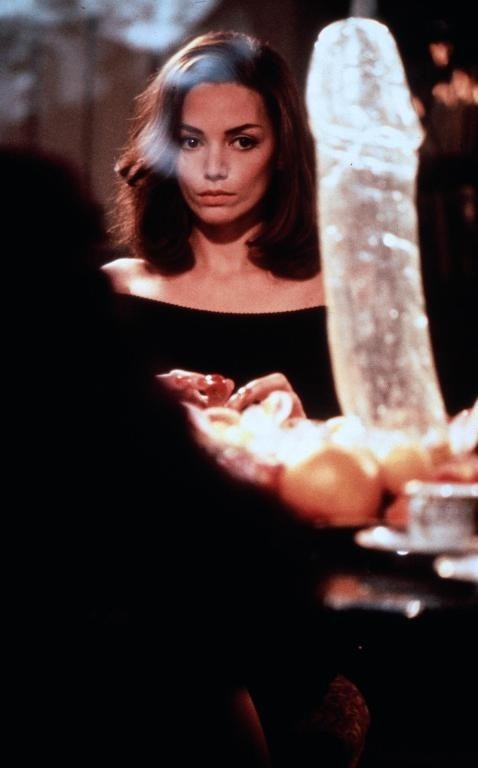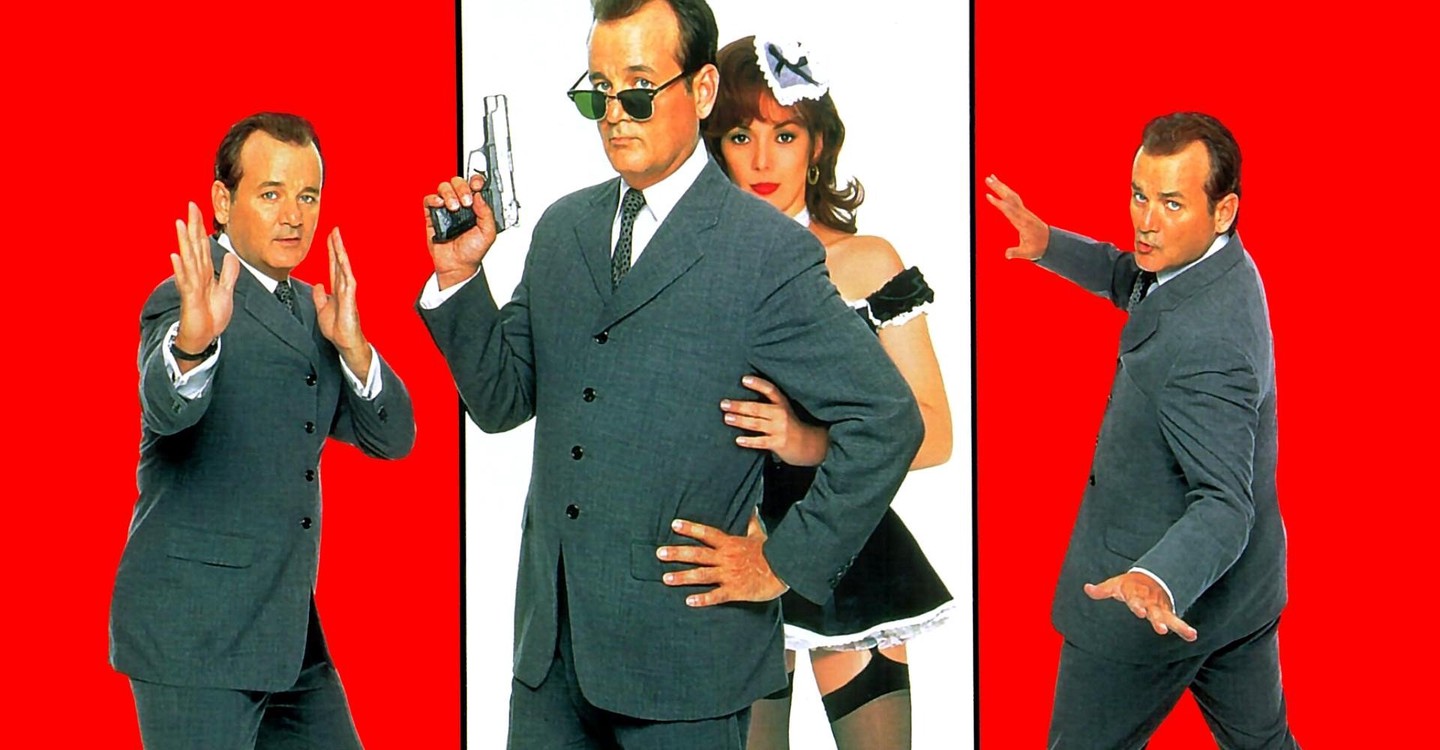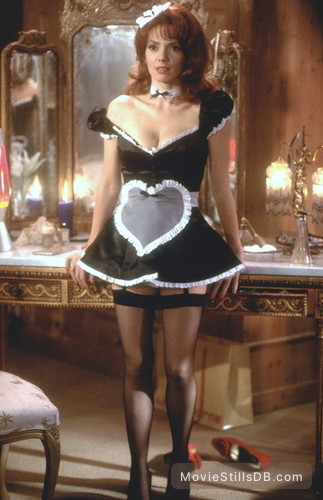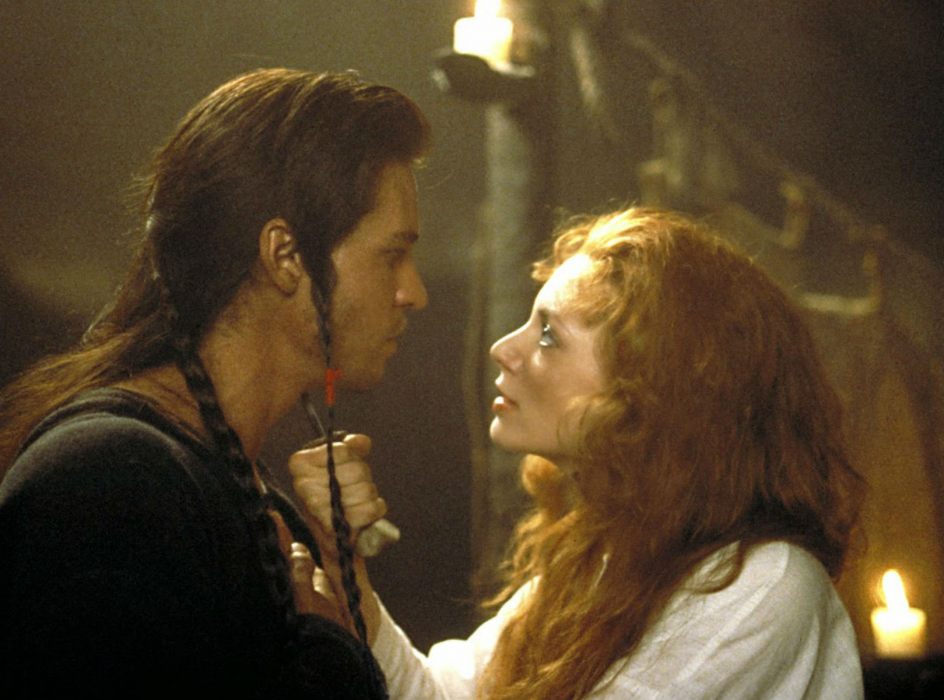Looking back at the pop culture mainstays of this Gen-Xer's gloriously misspent youth.
One of the most famous and oft-quoted Seinfeld scenes involves Bobka and Jerry's discovery of the existence of Cinnamon Bobka. After Elaine scoffs at the notion of such a thing, even calling it a "lesser Bobka," Jerry unleashes one of the great defenses of a freshly ground spice ever delivered:
People love cinnamon. It should be on tables at restaurants along with salt and pepper. Anytime anyone says, "Oh This is so good. What's in it?" The answer invariably comes back, Cinnamon. Cinnamon. Again and again.
Joanne Whalley is like Cinnamon.
 |
| Yes, I just compulsively double-checked my DVD copy and it's the unrated version, thank you very much. |
Let me explain. You see, during the formative years of my misspent youth, if I stumbled on a movie featuring the doe-eyed, petite, beautiful English actress, invariably I'd feel like Jerry does about Cinnamon: "Oh, this movie is so good. Who's in it? Joanne Whalley, you say? Well, there's my answer!"
Joanne Whalley is like Cinnamon. Because she spices up any film or television show in which she appears. It's funny because it's true.
 |
| Those eyes! |
Whalley, who celebrates a birthday this Sunday, August 25th, rose to fame in British television and film, before transitioning into a long Hollywood career in films like Willow (1988), Scandal (1989), Trial by Jury (1994), and The Man Who Knew Too Little (1997). Besides Willow—in which Whalley costars with future ex-husband Val Kilmer—few of Whalley's films seem to have large followings these days, but none of that is her fault. She's always been a consummate professional whose work stands the test of time. For instance, she's simply magical in Willow. But in terms of her work that made the biggest impact on my misspent youth, that would probably have to be two London-based films with more in common than you'd think, Scandal and The Man Who Knew Too Little. In each, Whalley plays women who are more than just the sum of sexual desires that corrupt men foist upon her, and her character arcs reflect those tensions.
-photo.jpg) |
| I've had to delete a number of potential captions for this one because they're all so off color, and I'm really trying to clean up my act. |
Scandal, a fictionalized recounting of the infamous Profumo affair, the 1960s British political/sex scandal, has the unmitigated audacity to pair Whalley with another '80s/'90s crush, Bridget Fonda (who also deserves her own Misspent Youth post; stay tuned). Scenes with Whalley and Fonda vigorously applying themselves to disreputable pursuits with various older, white male British government officials helps the movie more than live up to its title. There's an extended scene where the two are dressing and applying makeup for a night out, and as music scores the scene the camera zooms in for tight shots of the women fastening thigh-high stockings to garter belts, squeezing into form-fitting dresses, and applying lipstick to puckered lips. The scene is filmed so over the top erotically that it's a miracle film reels didn't spontaneously burst into flames at that moment when this thing was show in cinemas.
 |
| The two main reasons why Scandal left such an indelible impression on my teenage brain. |
Director Michael Caton-Jones is not shy about exploiting Whalley's beauty, with countless shots that leer and linger over her legs, or thighs, or other body parts. As blatant as these shots are, they're also fitting, as we are often seeing her through the perspectives of naughty old Brits like John Hurt or Ian McKellen. These shots also make us complicit in her objectification, indicting us right alongside these men. Her character's currency to them is her beauty—Hurt's character even describes her as possessing an "elemental beauty." Whalley is playing Christine Keeler, an exotic dancer, so naturally we're introduced to her via shots of her body. Hurt, as gadfly osteopath Stephen Ward, whisks her away from her lower class existence, becoming her loving yet platonic patron of sorts, which basically entails loaning her out for discreet affairs with an assortment of middle-aged Conservative Party members. She does so willingly, and Ward is mostly courteous and comforting to her along the way, yet he's also perversely selfish and the entire thing stinks of patriarchal mistreatment of a young, impressionable woman.
 |
| Many of the film's more heartbreaking scenes are the quiet ones between Hurt and Whalley, as their strange relationship grows more fractured. |
There's a moment where she rebels against her new high society life as a party girl by reminding Ward that she's only eighteen, and should be out having fun with people her own age. Whalley delivers the line with such force that you can't help but feel Christine's crushing realization that her glamorous lifestyle is not nearly as fulfilling as she'd imagined it would be. Eventually, she goes to the press and the entire scandal unravels publicly. In the end, there are no winners or losers. Christine, Ward, and nearly everyone involved take falls.
 |
| Whalley and Fonda absolutely dialed the heat up to eleven in Scandal. |
In many ways, Scandal was the perfect encapsulation of everything I loved about Joanne Whalley during my misspent youth. Her ethereal beauty is on full display, of course, but more importantly she delivers a heartbreaking performance, one that invested me in Christine's plight, then made me weep for how she's treated by the press, police, politicians, and most of London once the scandal breaks.
Whalley's work alongside Bill Murray in the seriously funny and criminally underrated The Man Who Knew Too Little is notable for several reasons. First, she and Murray have an easy, sweet chemistry. The affection in those large, hypnotic eyes of hers when she looks at him is, quite simply, heart-melting. Every person should have someone in their life who looks at them like Whalley looks at Murray. Second, she gets one of the sexiest introductions in '90s cinema: our first glimpse is of her legs, as she slides on nylons. You see, she's dressed as a French maid in that first scene, and rarely in the history of cinema, before or since, has anyone ever rocked a French maid outfit better than she does.
 |
| The Man Who Knew Too Little is a deliciously deadpan farce that's been highly underrated for over twenty years now. |
Whalley's work alongside Bill Murray in the seriously funny and criminally underrated The Man Who Knew Too Little is notable for several reasons. First, she and Murray have an easy, sweet chemistry. The affection in those large, hypnotic eyes of hers when she looks at him is, quite simply, heart-melting. Every person should have someone in their life who looks at them like Whalley looks at Murray. Second, she gets one of the sexiest introductions in '90s cinema: our first glimpse is of her legs, as she slides on nylons. You see, she's dressed as a French maid in that first scene, and rarely in the history of cinema, before or since, has anyone ever rocked a French maid outfit better than she does.
 |
| Forcing everyone since to raise their French maid game considerably. |
Murray, as sweet, but naive video store clerk Wallace Ritchie ("Blockbuster Video. Des Moines, Iowa.") winds up innocently embroiled in a deadly spy game, all while thinking it's part of the avant-garde London theater production that his brother signed him up for. He inadvertently answers a phone call intended for a hit man and soon enough an assortment of very bad people (including a hilarious Alfred Molina) think he's the hit man, and hilarity ensues. Murray expertly bumbles his way through one dangerous situation after another, often with the spunky Whalley by his side. She plays Lori, a British Defense Minister's call girl who's trying to blackmail the corrupt politician for an enormous sum of money. She's fiercely independent, whip-smart, sexy, and a real spitfire. So, naturally, Wallace falls hard. As did I the first time I saw this movie, and every subsequent time since.
-screenshot.jpg) |
| These two are simply delightful together. |
It's a treat watching Whalley show off her comedic skills alongside a master like Murray. While anyone paired with him in a comedy is likely going to play straight person to his riffing, Whalley does it so well that it only enhances Murray's performance. She also rolls her eyes with aplomb and zings in a few memorable one liners, like when Lori sarcastically purrs at Wallace, "Are you going to bring me that martini, or do I have to suck it out of the glass from here?" Whalley seems utterly in her element, and forms an extremely charming duo with Murray. I wish they'd made a sequel together, or at least another similarly deadpan-style film.
 |
| While I didn't go in detail about it in this piece, Willow is definitely one of Whalley's best performances. |
In those early, crucial years of my budding cinephilia, Joanne Whalley was a constant presence onscreen. Her name was rarely above the title, and she was never as famous here in the States as back in her native England, but I always noticed her. She never failed to bring a spark to every role, something magical that always caught my eye, and made me eagerly anticipate the next time she'd grace the screen. Much of it came back to those eyes: large, saucer-like, and always warm and inviting.
| She's got a feather duster and she knows how to use it. |
When considering which elements make her films enjoyable, one answer that invariably came back was, simply, Joanne Whalley. Like Cinnamon, she just makes everything better. I've never discussed this with other Joanne Whalley fans—and I don't believe I know any, personally, but maybe this piece will help bring us together! Still, it's possible I'm the only one who would make this analogy. That's fine. Because rarely has any other analogy seemed more perfect to me.
| Elegance, personified. |
Ooh La La! The French maid's outfit has got me all hot and bothered.
ReplyDeleteJoanne Whalley is from my neck of the woods, I've never bumped into her sadly.
If I ever ran into her I would gush so much I'd probably embarrass myself. I bet she gets that a lot, though.
Delete